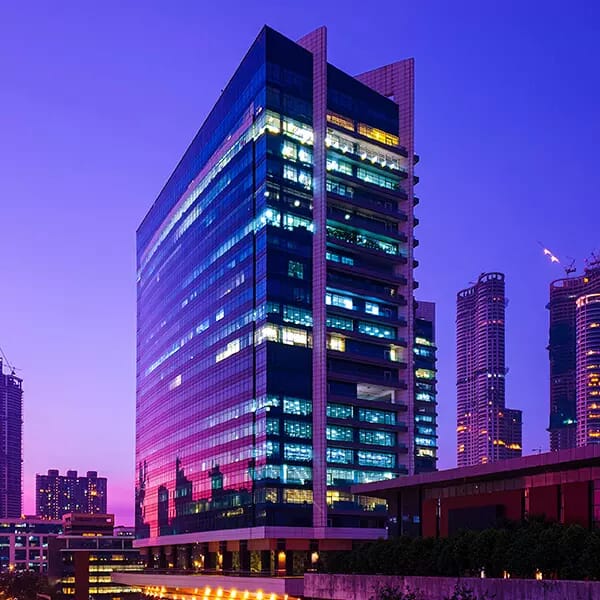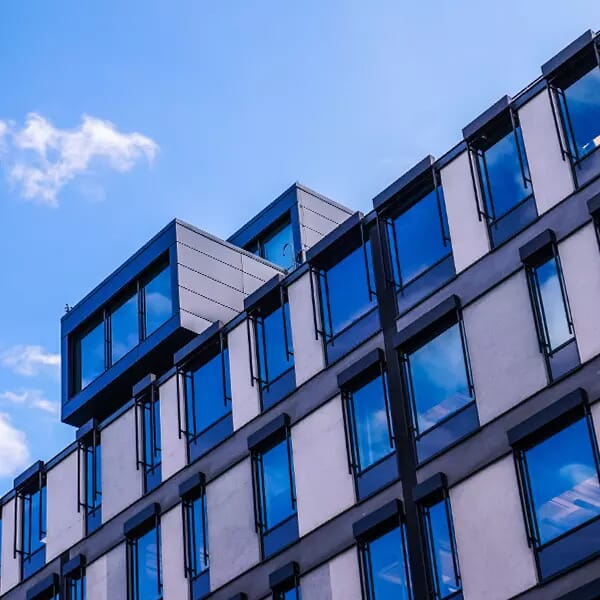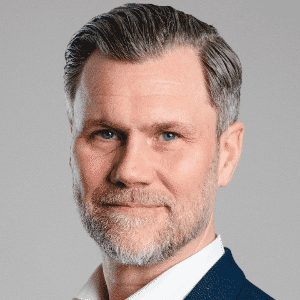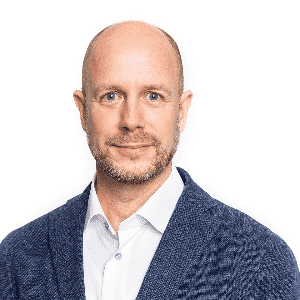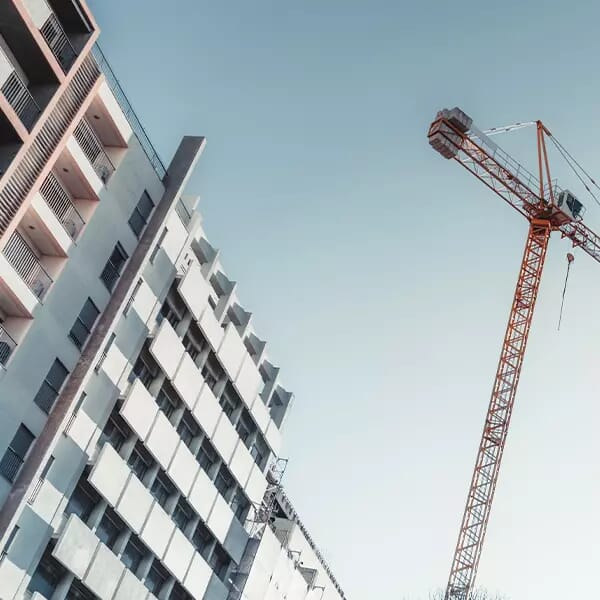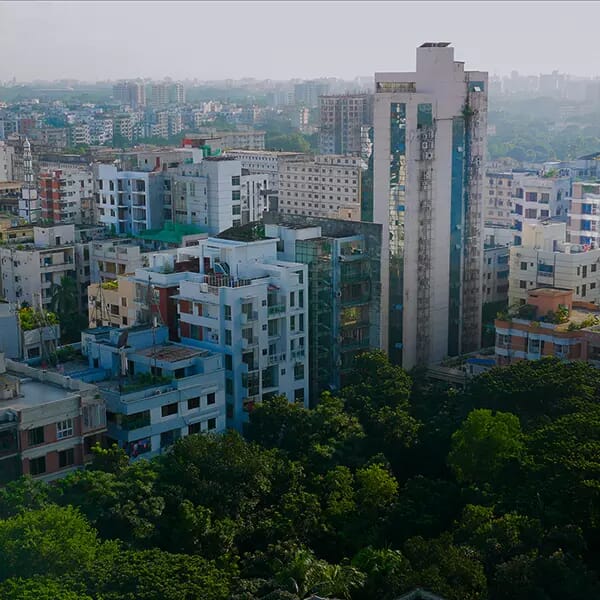 Brian Kingston, managing partner e CEO do Brookfield Property Group e da Brookfield Property Partners<br />Crédito: GRI Club/ Flavio Guarnieri
Brian Kingston, managing partner e CEO do Brookfield Property Group e da Brookfield Property Partners<br />Crédito: GRI Club/ Flavio GuarnieriBrookfield: It is an exciting time to be looking at Brazil
Global real estate CEO says Country is among the most attractive for investments and gives his views on Latin America.
August 23, 2019Real Estate
"Brazil is one of the most interesting places to be investing in." This is how Brian Kingston">Brian Kingston, managing partner and CEO of Brookfield Property Group and Brookfield Property Partners, opened his talk with a select group of real estate players in a club meeting organized by GRI Club Real Estate Brazil on August 20, in São Paulo.
He remarked on the transformations the country has gone through, pointed to the real estate segments the group has the most appetite for locally, and revealed what he thinks about Latin America as a whole. GRI Hub had exclusive access to the meeting and features the main topics discussed by the executive, who has already been confirmed as the keynote speaker of Latin America GRI 2020. Check it out:
General view on investments in Brazil
"Brazil is one of the most interesting places to be investing in. The country is coming out of the downturn, the economic performance starts recovering, the local performance of our assets is positive. The interest rates are going down pretty dramatically – but trust me, in comparison to the rest of the world, they are still high interest rates. Developing countries like India and China both had a pretty good run in the last years and are becoming increasingly unstable, while Brazil is looking increasingly more stable. So I actually think it is a pretty exciting time to be looking at Brazil."
Favorite asset classes in Brazil
"Because of the scale of our business and the size of the funds we are investing, we need to look at asset classes that have depth and scale. That is the case of office buildings and shopping centers in São Paulo and Rio. When it comes to industrial & logistics, since it is a little harder to buy existing products, we have been increasingly looking at developing and creating new ones. There is a number of other sectors in which we are active in other parts of the world, like multifamily or senior housing. We do not have the same depth or liquidity in those markets in Brazil so it is a little harder to look at those asset classes. It is more likely we are going to be concentrated on offices, retail and industrial & logistics."
Lessons learned from a century in Brazil
"We are not a foreign investor in Brazil. We are locals. We have a huge team of people that has deep experience on the market and that is how we set our businesses around the world. Although we are a global organization and we gather capital from lots of places around the world, each of our businesses in each market has to have deep local expertise. That is critical because real estate is obviously a local business. We cannot just buy a couple buildings and then decide to shut the business down after some years and go back. It is important to stay, continue to operate through the cycle. There are good times and bad times. However, we made a decision: We want to be in Brazil, we like this market because of the scale, the long-term demographics and other things and we are going to survive through the cycles. There are a lot of foreign investors that come and go like that. Generally we like to buy from them when they're leaving."
Possible threats to the optimism towards Brazil
"It is not easy to make the kind of changes that Brazil made the last couple of years and continues making. The direction seems to be right but there are always things that can get set off. If you look at Argentina, for example – not that Brazil is in any way at the same category, but based on Argentina, we see how quick things can change from optimism to extreme pessimism. We are optimists, but need to be realistic."
Opportunities in Latin America
"Before we invest in a country we generally try to make sure that somehow we can be there for the next 100 years – meaning there's scale, opportunities and depth on the market. Obviously Brazil being the largest economy in Latin America that is easy. Many other countries in the region do not necessarily offer that same liquidity all the time. We look for specific opportunities, but there is no other country in the region that attracts us more than Brazil."
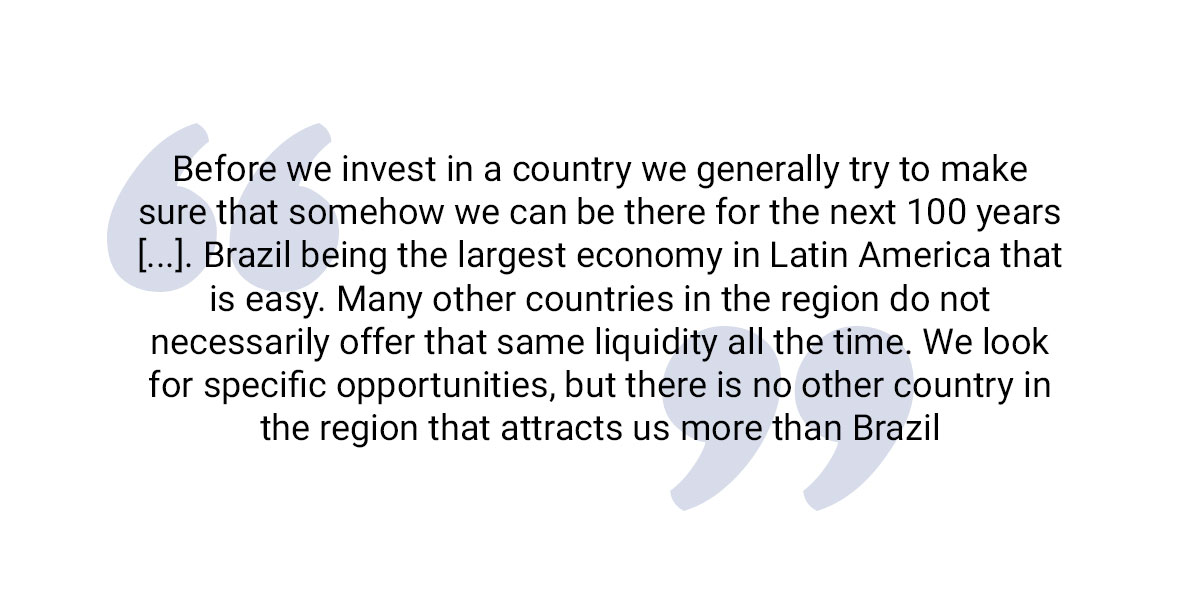
Global asset classes
"During the last decade we globalized our office business. Retail and logistics have the potential to be as well. Not every tenant is going to be global, but many of them. As many of the tenants operate in multiple countries, know us and have a long track record from us, I think increasingly these asset classes are becoming more global."
Coworking
"The phenomenon surrounding coworking is identified as office tenants just wanting to be treated like customers. In the past, there was a negotiation, sign a lease and we would see each other in 20 years when the lease came up. What we are finally seeing in offices is tenants demanding – and landlords responding in some way – that they want a higher level of services. The good news for the landlord is that the tenants pay for it. The rates coworking facilities are charging are 30%-40% premiums over regular rentals in exchange for the additional services. Landlords should not be worried about that. There is an opportunity for all of us to be more engaged with our tenants. In some cases, we can provide more flexibility – so if the risk profile does change, we just need to manage and make sure not to have the entire building in monthly leases but having some arrangement that is more flexible to attract and keep clients. We do have some outsource providers in our buildings but we are also developing internal capabilities. I think there is a market for small enterprises, 3-4 person businesses that are looking to spend maybe a period of time. They are tenants for a coworking company. As a landlord, it is difficult for us to take a floor and manage it at that level. But there are other cases of larger tenants that simply want more flexibility, a more flexible arrangement – that's where we can provide those services."
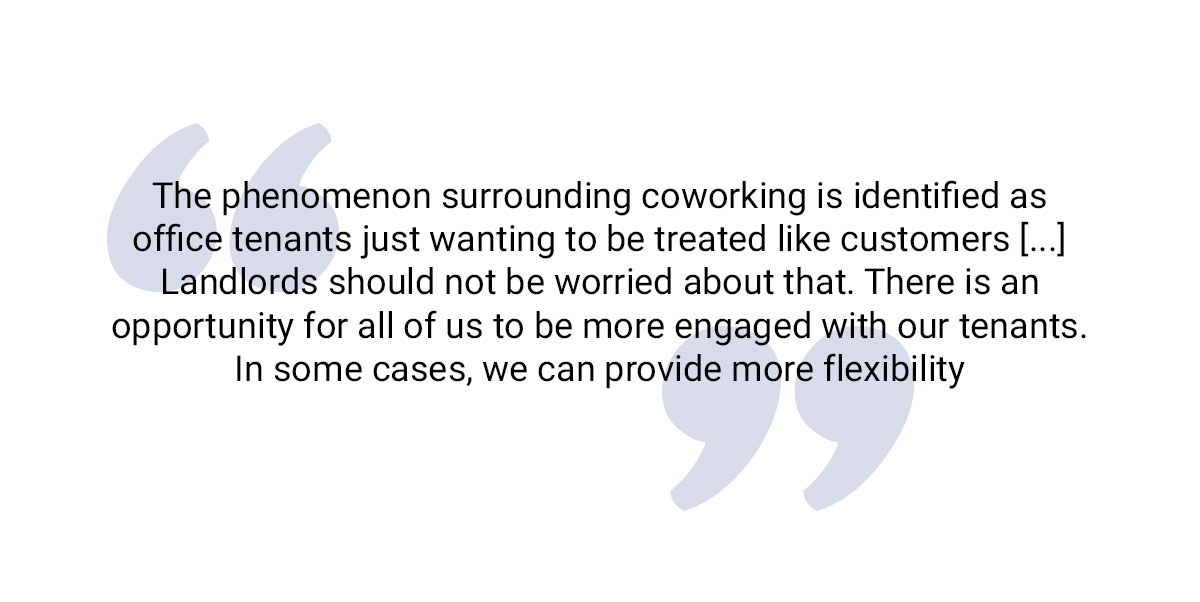
Sharing of logistical properties
"Coworking companies equivalent in logistics would make sense. I think it is the same approach of offices. You don't want to have a million-square-foot logistics facility entirely on that basis but having some part could be very beneficial because in general you charge a premium for that flexibility."
Technology and proptech
"No question proptech is coming, it's important, it's going to change things but it's not like in 20 years from now no one is going to be in real estate. A lot of this technology is an enabler, it will allow us to run our buildings more efficiently, manage costs better. We can design, build and deliver new developments maybe in a more efficient way. However, the basic premise is that what we are doing is providing spaces for companies for them to have their operations or show their goods to customers or take part in the logistic cycle. None of this changes. So what we should ask ourselves is: What is coming? What can we do? And how should it be addressed? Our approach to technology is being made in a large amount in the perspective of looking for more operation efficiency. We are also making small investments in a number of these proptechs. Technology may have a secondary impact in real estate – like in the case of driveless cars. It's not disruptive to real estate but it can change the definition of how we value a piece of real estate or the location."
By Giovanna Carnio, editor-in-chief
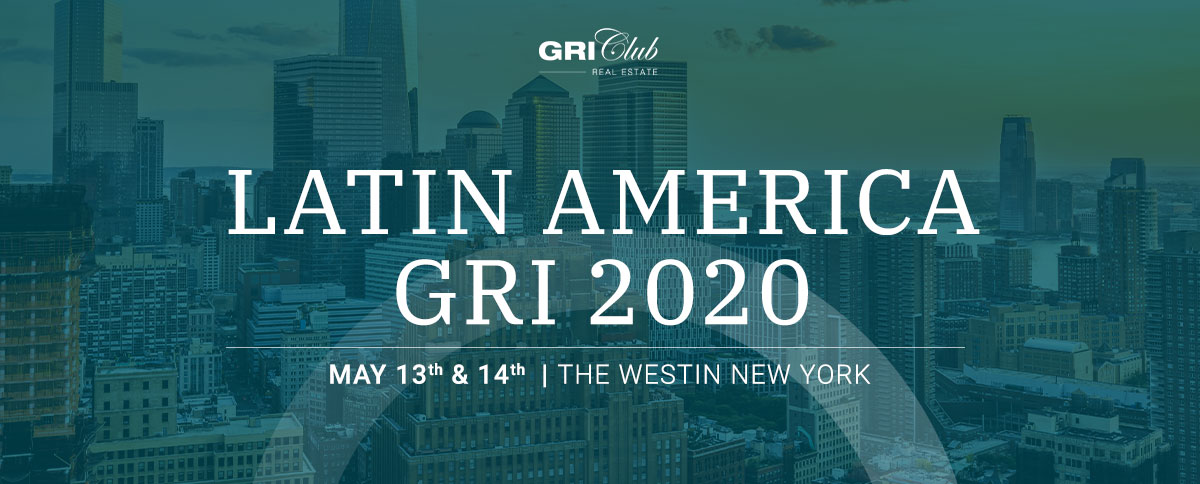
Brian Kingston will be the keynote speaker of Latin America GRI 2020, which will bring together the main names of the real estate market of Latin America on May 13 and 14, in New York, to debate the directions of the industry in the region, in an informal environment of intense networking. Learn more about the program and about how to take part.
He remarked on the transformations the country has gone through, pointed to the real estate segments the group has the most appetite for locally, and revealed what he thinks about Latin America as a whole. GRI Hub had exclusive access to the meeting and features the main topics discussed by the executive, who has already been confirmed as the keynote speaker of Latin America GRI 2020. Check it out:
General view on investments in Brazil
"Brazil is one of the most interesting places to be investing in. The country is coming out of the downturn, the economic performance starts recovering, the local performance of our assets is positive. The interest rates are going down pretty dramatically – but trust me, in comparison to the rest of the world, they are still high interest rates. Developing countries like India and China both had a pretty good run in the last years and are becoming increasingly unstable, while Brazil is looking increasingly more stable. So I actually think it is a pretty exciting time to be looking at Brazil."
Favorite asset classes in Brazil
"Because of the scale of our business and the size of the funds we are investing, we need to look at asset classes that have depth and scale. That is the case of office buildings and shopping centers in São Paulo and Rio. When it comes to industrial & logistics, since it is a little harder to buy existing products, we have been increasingly looking at developing and creating new ones. There is a number of other sectors in which we are active in other parts of the world, like multifamily or senior housing. We do not have the same depth or liquidity in those markets in Brazil so it is a little harder to look at those asset classes. It is more likely we are going to be concentrated on offices, retail and industrial & logistics."
Lessons learned from a century in Brazil
"We are not a foreign investor in Brazil. We are locals. We have a huge team of people that has deep experience on the market and that is how we set our businesses around the world. Although we are a global organization and we gather capital from lots of places around the world, each of our businesses in each market has to have deep local expertise. That is critical because real estate is obviously a local business. We cannot just buy a couple buildings and then decide to shut the business down after some years and go back. It is important to stay, continue to operate through the cycle. There are good times and bad times. However, we made a decision: We want to be in Brazil, we like this market because of the scale, the long-term demographics and other things and we are going to survive through the cycles. There are a lot of foreign investors that come and go like that. Generally we like to buy from them when they're leaving."
Possible threats to the optimism towards Brazil
"It is not easy to make the kind of changes that Brazil made the last couple of years and continues making. The direction seems to be right but there are always things that can get set off. If you look at Argentina, for example – not that Brazil is in any way at the same category, but based on Argentina, we see how quick things can change from optimism to extreme pessimism. We are optimists, but need to be realistic."
Opportunities in Latin America
"Before we invest in a country we generally try to make sure that somehow we can be there for the next 100 years – meaning there's scale, opportunities and depth on the market. Obviously Brazil being the largest economy in Latin America that is easy. Many other countries in the region do not necessarily offer that same liquidity all the time. We look for specific opportunities, but there is no other country in the region that attracts us more than Brazil."

Global asset classes
"During the last decade we globalized our office business. Retail and logistics have the potential to be as well. Not every tenant is going to be global, but many of them. As many of the tenants operate in multiple countries, know us and have a long track record from us, I think increasingly these asset classes are becoming more global."
Coworking
"The phenomenon surrounding coworking is identified as office tenants just wanting to be treated like customers. In the past, there was a negotiation, sign a lease and we would see each other in 20 years when the lease came up. What we are finally seeing in offices is tenants demanding – and landlords responding in some way – that they want a higher level of services. The good news for the landlord is that the tenants pay for it. The rates coworking facilities are charging are 30%-40% premiums over regular rentals in exchange for the additional services. Landlords should not be worried about that. There is an opportunity for all of us to be more engaged with our tenants. In some cases, we can provide more flexibility – so if the risk profile does change, we just need to manage and make sure not to have the entire building in monthly leases but having some arrangement that is more flexible to attract and keep clients. We do have some outsource providers in our buildings but we are also developing internal capabilities. I think there is a market for small enterprises, 3-4 person businesses that are looking to spend maybe a period of time. They are tenants for a coworking company. As a landlord, it is difficult for us to take a floor and manage it at that level. But there are other cases of larger tenants that simply want more flexibility, a more flexible arrangement – that's where we can provide those services."

Sharing of logistical properties
"Coworking companies equivalent in logistics would make sense. I think it is the same approach of offices. You don't want to have a million-square-foot logistics facility entirely on that basis but having some part could be very beneficial because in general you charge a premium for that flexibility."
Technology and proptech
"No question proptech is coming, it's important, it's going to change things but it's not like in 20 years from now no one is going to be in real estate. A lot of this technology is an enabler, it will allow us to run our buildings more efficiently, manage costs better. We can design, build and deliver new developments maybe in a more efficient way. However, the basic premise is that what we are doing is providing spaces for companies for them to have their operations or show their goods to customers or take part in the logistic cycle. None of this changes. So what we should ask ourselves is: What is coming? What can we do? And how should it be addressed? Our approach to technology is being made in a large amount in the perspective of looking for more operation efficiency. We are also making small investments in a number of these proptechs. Technology may have a secondary impact in real estate – like in the case of driveless cars. It's not disruptive to real estate but it can change the definition of how we value a piece of real estate or the location."
By Giovanna Carnio, editor-in-chief
Latin America GRI 2020

Brian Kingston will be the keynote speaker of Latin America GRI 2020, which will bring together the main names of the real estate market of Latin America on May 13 and 14, in New York, to debate the directions of the industry in the region, in an informal environment of intense networking. Learn more about the program and about how to take part.
